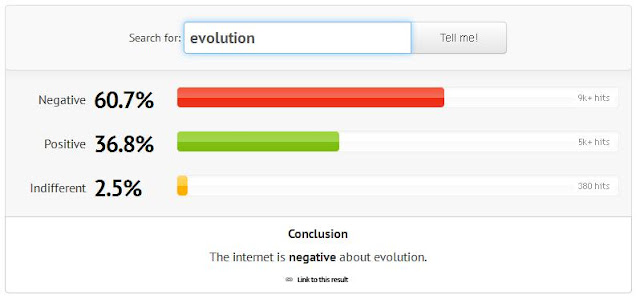Let's start by considering some broad subjects:
Where does the internet find truth and meaning?
It's probably not at all surprising that the internet skews toward the science-loving end of the spectrum, at least at the broadest level. I'm kind of surprised at the level of negativity about religion, to be honest.
I would like to be heartened by the overflow of positive regard for skepticism, but it occurs to me that whatever methodology they're using probably cannot sort out the context of positive or negative statements ... so if a post is saying that it supports science, but then puts forward a concept like intelligent design as being scientific, it would likely count as a pro-science posting, even though it's really contradicting and undermining scientific inquiry and findings. Similarly, someone who supports being skeptical of evolution or skeptical of global warming would probably count toward being positive toward skepticism, even if their approach to the facts is fundamentally dogmatic, authoritarian, and revisionary instead of supporting principles of skeptical inquiry.
Which leads us to the next question ...
Does the internet prefer evolution or creationism?
The thing I find most interesting about this is that while there's a lot of indifference about creationism, there's virtually no indifference about evolution. This runs counter to my own experience. I know several people who are religious but are fairly indifferent about whether or not evolution is the physical mechanism of creation. In other words, they're religious but believe that God started evolution. But I know very few people on either side of the debate that are indifferent about creationism.
However, given the extremely low hits on which "Creationism" is based, probably not much should be made of comparing these graphs. The "evolution" graph itself is, I think, telling enough on its own.
To put some of these values in context, though, we should look at a few baseline moral concepts, to see how they rate on the internet:
What does the internet think about morality?
I will let the above conclusion speak for itself ... for now. It's worthy of another post at another time.
On a morality-related note, though ...
What does the internet think of religion?
Christianity, Judaism, and Islam all rank positively ... but check out atheism & Buddhism! Amazingly polarized results on these religious viewpoints. Again, I'll let the results speak for themselves, although I'm sure I'll come back to this in another post sometime.
For comparison, though:
So atheists are viewed basically as negatively as their doctrine ... but both Christians and Muslims are (fairly or unfairly) viewed negatively by the internet, despite the fact that their religions themselves are viewed positively.





















No comments:
Post a Comment